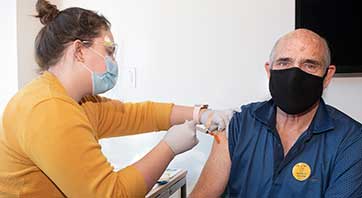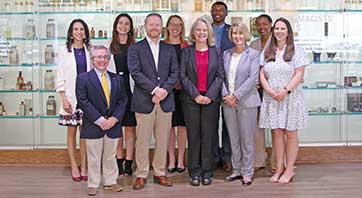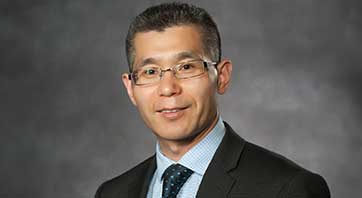Eyes on the prize: Easing the burden on corneal transplant patients
Story by Holly Prestidge, MCV Foundation
(1).png) Qingguo Xu, D.Phil., associate professor of pharmaceutics at the VCU School of Pharmacy, patented an approach to more effective and efficient post-surgical care for corneal transplant recipients. Dr. Xu is a former Blick Scholar. (Photo by Danny Tiet)
Qingguo Xu, D.Phil., associate professor of pharmaceutics at the VCU School of Pharmacy, patented an approach to more effective and efficient post-surgical care for corneal transplant recipients. Dr. Xu is a former Blick Scholar. (Photo by Danny Tiet)
The human eye is often called a window into one’s soul. It’s a miraculous organ that detects light wavelengths through tiny rods and cones and translates them into images that the brain processes via the optic nerve.
But sometimes, those windows get dry, dirty or damaged. And while eye drops often provide some relief, half of those drops will inevitably roll down our cheeks, across our eyelids — essentially, anywhere but our eyes.
It is a common annoyance for many people, but for corneal transplant recipients — who rely on eye drops following surgery — wayward drops are not just irksome, they could mean the difference between one transplant or two, maybe even three. With each rejected cornea, there are significantly higher rejection risks for the next transplant.
Through his now-patented delivery method, one VCU researcher aims to reduce the risk of corneal transplant rejection via nanoparticle injections that could dramatically increase transplant success rates.
Qingguo Xu, D.Phil., is an associate professor of pharmaceutics and ophthalmology at the VCU School of Pharmacy who specializes in nanotechnology drug delivery and eye diseases. He is the principal investigator of a study that uses an injection of nanoparticles to slowly release corticosteroids into the eye after corneal transplant surgery.
Dr. Xu, who was recognized for his exceptional early career work in 2019 with VCU’s Blick Scholars award, collaborated with researchers in the U.S. and around the world, including Justin Hanes, Ph.D., of Johns Hopkins University, and collectively the team published a 2023 paper in Science Advances called “Six-Month Effective Treatment of Corneal Graft Rejection.”
Corneal transplants are common, with more than 80,000 performed in the U.S. annually. The cornea is the clear, dome-shaped surface of the eye that is largely responsible for bending light into the retinas at the back of the eyes and supporting the eyes’ ability to focus.
Transplants are needed when diseased corneas are no longer functioning properly. Depending on the severity and type of the cornea disease, a surgeon can replace a layer of the cornea or the entire cornea.
.png) From a global perspective, the U.S. performs the most corneal transplants, thanks to an abundance of donated corneas and a well-established eye bank that offer them for both transplants and research. Today’s transplant outcomes are largely successful for normal-risk corneal transplants, but a small number — roughly 5% to 10% of patients — experience rejections.
From a global perspective, the U.S. performs the most corneal transplants, thanks to an abundance of donated corneas and a well-established eye bank that offer them for both transplants and research. Today’s transplant outcomes are largely successful for normal-risk corneal transplants, but a small number — roughly 5% to 10% of patients — experience rejections.
Early signs of rejection can stem from the intense burden on patients following surgery. Normal treatment following a corneal transplant involves repeated eye drop dosing. For some, that means six to eight times daily, for weeks or months at a time. Others with a higher risk of rejection may need eye drops hourly during that same span.
Therein lies the problem, Dr. Xu said. Eye drops are challenging for many patients. Countless amounts of medicine are wasted when patients can’t get enough of the drops into their eyes. But without the drops, their risk of corneal graft rejection increases.
“For some people, it’s very difficult to use eye drops,” Dr. Xu said, “And at six to eight times per day after transplantation, that’s a huge burden.”
Corneal transplants, while generally successful, do come with some risks, including infections, bleeding, even issues with the sutures used to secure the donated cornea. If the first transplant is rejected and a second is needed, the risk of rejection rises sharply to about 50% for that second procedure.
“That’s a high-risk situation,” Dr. Xu said. “If you have to get a second transplant, there is a good chance you might need a third, and eventually, you could lose the eye altogether.”
Dr. Xu’s novel approach cuts out the hassle of eye drops by injecting the medicine between the clear outer membrane of the eye (conjunctiva) and the cornea, an area, which can hold critical amounts of medicine.
Thus far, he is seeing good preclinical results, which have shown six-month efficacy through using only a single subconjunctival injection next to the cornea. The slow release of the corticosteroids, combined with getting the medicine exactly where it is needed, effectively eliminates the need for frequent eye drop dosages.
The medicines used are already available and safe, he said. His study simply changes the delivery of the medicine to the eyes by encapsulating the antirejection drugs in nanoparticles, which help control the release of a commonly used corticosteroid over time. The benefit of this approach is that one injection is provided after the transplant surgery compared to several doses of eye drops a day.
“An easier treatment plan means higher success rates for patients,” Dr. Xu said, “and fewer transplants overall.”
The project is supported by $2 million in research project grants from the National Eye Institute, part of the National Institutes of Health. Dr. Xu also received VCU commercialization funding earlier this year to support the future clinical translation of ocular drug delivery systems for treating various eye diseases.
Fueling Innovation Through Junior Faculty Research
Every four years, VCU Health Sciences selects four to six junior faculty members to become Blick Scholars, a prestigious award that honors and invests in their promising research.
The George and Lavinia Blick Research Fund was established in 2009 through a $2 million gift dedicated to research on the MCV Campus. Inspired by the care that her father and other loved ones had received at MCV and, later, VCU Medical Center, Lavinia Blick made the gift specifically to advance research across the academic health system.
“The Blick Scholar award is a premier recognition for those junior faculty members who have been exceptionally successful in research,” said Marlon Levy, M.D., interim senior vice president for VCU Health Sciences and interim CEO of VCU Health System. “They are an extraordinary group. Without question, we are extremely grateful for the foresight of George and Lavinia Blick to establish this fund.”
If you would like to support research at the VCU School of Pharmacy, please contact Louie Correa, the school’s senior director of development, at lacorrea@vcu.edu or 804-828-3016.
ENTREPRENEURSHIP AND INNOVATION
VCU recognized as first Pharm.D. program of merit in gerontology education


ENTREPRENEURSHIP AND INNOVATION


ENTREPRENEURSHIP AND INNOVATION
Chemical designed by professor launches as tool for cholesterol research and future drug discovery

